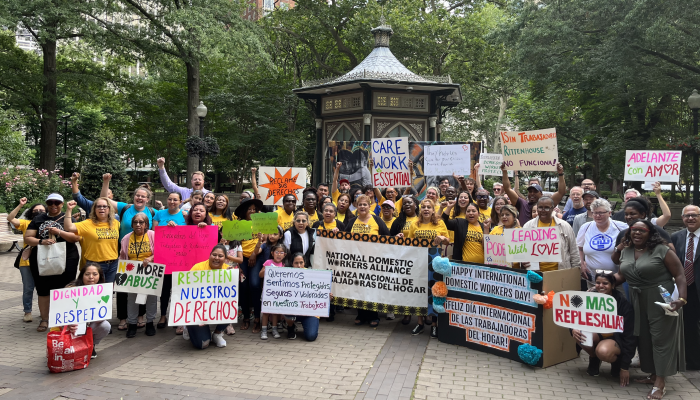There are over 16,000 domestic workers in Philadelphia — 84% are women, and 54% are women of color. These employees act as caretakers for those who need extra help, look after our families, and take care of the homes we live in. Yet, domestic workers have historically been left out of federal and state labor protection laws. In 2019, Philadelphia City Council passed the Domestic Worker Bill of Rights. This spring, the Domestic Workers Task Force released a new report to share updates on the progress made in the last few years.
Here are five things you should know from the report.
1. The Domestic Worker Bill of Rights protects Philly’s domestic workers.
The Domestic Worker Bill of Rights establishes labor law provisions that employers must follow to better protect domestic workers. There are many protections under the Domestic Worker Bill of Rights, including the right to a written contract in English and the employee’s preferred language, and the right to two weeks severance pay or two weeks notice. Model contracts translated into many languages are available on the Department of Labor’s website.
2. Employers are supportive and grateful for the Domestic Worker Bill of Rights.
The Domestic Worker Bill of Rights offers clear guidelines and expectations for employers. One employer has said that, “Without exception, every single employer I’ve spoken to is grateful for the guidance of a contract and for the ability to have hard conversations about expectations.” She continued saying that the Bill of Rights is “a benefit to everyone involved.”
3. Wage and Hour tracking log books are available from the Office of Worker Protections.
Documentation is an ongoing challenge in enforcement for “invisible economy” industries. The logbook is a tool to establish a record of hours and can be used as evidence in labor violation investigations. Domestic workers can use the logbook to create a visible record of the time, place, and tasks they worked. To request a logbook, you can email the Office of Worker Protections or call them at (215) 686-0802.
4. The City has a task force looking into future improvements.
Philadelphia’s City Council created the Domestic Worker Standards and Implementation Task Force. The task force upholds and defends the Domestic Worker Bill of Rights. Members of the task force include City Council Members, City employees, advocates, domestic workers, and employers. They meet several times a year and the meetings are open to the public.
5. Another report with specific recommendations will be published this fall.
The Domestic Worker Bill of Rights has led to key improvements and victories for domestic workers within the City of Philadelphia. However, many challenges remain to be overcome. The second portion of our report, forthcoming in the next year, will have specific policy recommendations. Feedback from the city’s Community Outreach and Education Fund program participants will be included. This information will better help clarify what is working well on the ground, and where policies may fall short.
Read more in the first report from the City’s Domestic Worker Task Force in English and in Spanish.




